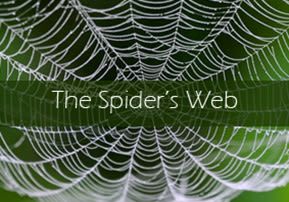
The Spider’s Web
The Evil Inclination at first resembles a thin spider’s web; but once something gets caught, it’s like freeing himself from the heaviest and thickest cables…

Why is it that most people are so frightened by spiders and other bugs? These creatures are so much smaller than us and theoretically, we have so much power over them. We can decide whether to spare their lives or destroy them; it’s either a few swoops of the broom or a hard-bottomed shoe. Even men sometimes have a hard time dealing with HaShem’s tiniest critters. Our decision to end their lives should not be wanton and is only permitted if they are poisonous or bothersome (Gemara), with a leaning toward directing them outside or away from us. On Shabbat, we are not permitted to kill spiders or other insects at all unless they pose a definite danger to us. Like all interactions with other life forms, we must be humane and make every effort not to cause undue suffering.
The most distinctive aspect of many spiders is its unique home – the spider’s web. Our Sages discussed the merit of the spider by way of  the web that was quickly spun over the entrance to the cave where King David was hiding and which consequently saved his life. Conversely, we are told that spiders’ webs fueled the burning fire in the Beit Hamikdosh (Temple).
the web that was quickly spun over the entrance to the cave where King David was hiding and which consequently saved his life. Conversely, we are told that spiders’ webs fueled the burning fire in the Beit Hamikdosh (Temple).
If you have ever walked through a web inadvertently, you will recognize the disturbing feeling of those sticky silken threads. Woe to the insect which gets caught up in this masterfully woven trap and is destined to become the spider’s next meal. As soon as it comes into contact with the glue-like properties, it gets more and more tangled. The harder it fights to release itself, the greater the bond. Our yetzer hara (evil inclination)is just like a spider’s web. It catches us in its adhesive net and if we don’t pull away immediately, it takes control of us and we are soon subjugated to its will rather than our own or more importantly, HaShem’s. From a thin, translucent covering it turns into a fully opaque shroud until we can barely even see the light.
Regarding the yetzer hara, it is written; “At first it resembles the thread of a spider’s web but at the end it is like the thick rope of a wagon” (Talmud Bavli Tractate Sukkah 52a)
The hazard of stumbling into the yetzer hara’s snare is the enticement to do sinful things which we know are forbidden."The strongest trick in the storehouse of the yetzer hara is to take what you know to be truth and make you come to have doubts about it. If you are not careful, this can cause you to come to sin even where you are spiritually strongest." (Duties of the Heart, Rabbi Ibn Pakudah, 1050 C.E. Spain). Being embroiled in a lie is like being trapped in a web. The deeper we go into transgression, the more bound up we become until, like a straitjacket, there is no escape. If we don’t want to be food for the spider (yetzer) it’s better to avoid the temptations altogether. Since we perceive spiders as creepy, giving us the chills, we usually do our utmost to keep as far away as possible. Why then, can’t we do the same with our yetzer hara? Just because we can’t see it, doesn’t mean it isn’t there, hovering overhead ready to appear unexpectedly at any second. As with our little eight-legged ‘friend’, just give that unwelcome intruder a swat right out the door.
One interesting fact about the spider’s web is that it is made from a protein-rich substance miraculously produced in the spider’s body. Often, when the web loses its adhesive power and can no longer catch its prey, the spider will eat the nutritious web only to rebuild a fresh one. So too with our yetzer hara; If we stay out of the ‘web’ long enough, it will lose its domination over us until it is forced to sustain itself without feeding on our souls. Rebbe Nachman, may his memory be blessed, instructs us to be happy. Happiness is instrumental in warding off the yetzer hara since it thrives on our sadness and melancholy.
We are told that demons can hide in the webs of our home. One way of ensuring that there are no spiders in our homes is to keep it clean and constantly sweep the corners. Just as we try to free our dwelling place from cobwebs, we should also strive to eradicate the foul thoughts which contaminate our minds. Only holiness and purity reserve the right to enter our homes and our hearts.
In Talmud Bavli Tractate Sukkah 52a Rav Judah explained, “In the time to come, the Holy One, blessed be He, will bring the evil inclination and slay it in the presence of the righteous and the wicked. To the righteous it will have the appearance of a towering hill, and to the wicked it will have the appearance of a hair thread. Both the former and the latter will weep; the righteous will weep saying, ‘How is it that we were unable to overcome such a towering hill?’ The wicked will also weep saying ‘How is it that we were unable to conquer this hair thread?’
We don’t need to wait for Moshiach to eradicate the yetzer hara from our lives. If we work on conquering all our difficulties with true emuna, prayer and tshuva (repentance), we will see that they are nothing more than penetrable cobwebs. In Sichos HaRan #232, Rebbe Nachman taught, "You are like a warrior who is prepared to breach a mighty wall. But when you come to the gate, you find it blocked by a spider web. If you returned in defeat because of the spider web, you would be the most foolish of men."







7/21/2011
You did it again……. Chaya, you always manage to connect a everyday item ..like a spider web, to our inner neshamas. You are a very talented writer.
7/21/2011
Chaya, you always manage to connect a everyday item ..like a spider web, to our inner neshamas. You are a very talented writer.
7/19/2011
Brilliant! I really loved this article. And I just had an experience in a home with some seriously bad energy, and a spider….. so it really gave me some answers.